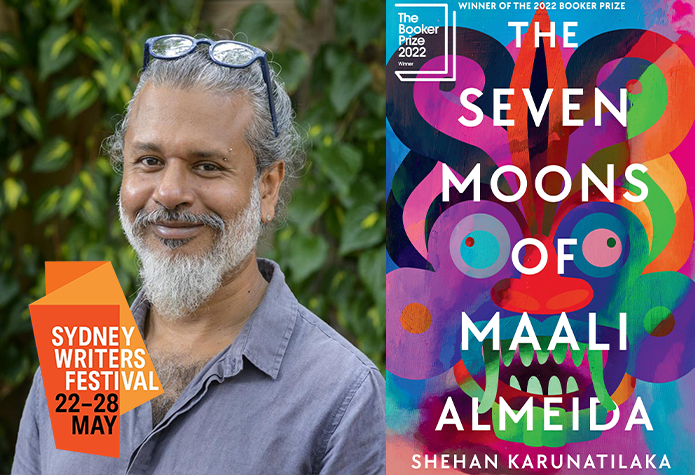Shehan Karunatilaka’s 2022 Booker Prize winning novel, The Seven Moons of Maali Almeida, is an absurdist, comic meditation upon the harsh realities of the Sri Lankan civil war — however, for many readers including myself, it doesn’t immediately strike you as dealing with such heavy subject matter. A room full of curious young writers, Sri Lankan-Australians and other admirers of the author alike filled the halls of Bay 16 at Carriageworks on the evening of May 26, where Shehan Karunatilaka spoke with The Monthly editor Michael Williams.
Throughout their conversation, Karunatilaka often noted that his beautiful home country seems to go from catastrophe to catastrophe, and that individuals either blame their leaders or foreign influences. However, in Karunatilaka’s absurdist eyes, why not place the blame on the spirits flying around Sri Lanka, just waiting for their passports to be stamped in purgatory? And until they can get that done, they will continue to run around whispering bad ideas in people’s heads? It seems like a plausible explanation. Here lie the basic inspirations for his story, and for his characters.
Karunatilaka comically illustrates that the police, whom Maali Almeida interacts with in efforts to solve his murder, are an excellent illustration of the various societal forces that make justice unlikely for the protagonist. On dying, Karunatilaka says that we comfort ourselves with this delusion that when we breathe our last breath, we open our eyes again: that all will be revealed, that the universe will spread its secrets before us, and God will tell us her name. However, his novel puts forward the notion that the afterlife may perhaps be much like life itself, but decidedly less efficient. These subjects and questions are confronting and unanswerable, but Karunatilaka’s work invites the reader to pose these questions to themselves in a safe, almost satirical environment, much like a lot of absurdist or magical realist literature does.
As such, these questions feel less overwhelming for a reader, since they have a sense of control as to whether or not they’d like to engage with them. If they are uninterested, they have a ridiculous plot to re-engage with in front of them. Karunatilaka also shared his moral insights and speculations with the audience: when you die, you die a second death, almost, when the last person on earth speaks your name or remembers you — this is perhaps why ghosts don’t seem to last more than three generations. Again, he made this claim in passing, all a part of a much more lighthearted conversation with Williams about the processes of world-building and character creation that coalesce to create a story.
Shehan Karunatilaka’s work continues to pave the way for many Sri Lankan and South Asian writers across the globe, with prestigious accolades and worldwide travel aiding him in making a larger name for himself and for the people he represents. It is also worth remembering that, unlike his protagonist Maali, Karunatilaka is a humorous and affable personalityIt seems that this has engendered a lightness and charm within Karunatilaka’s novel that would not have been otherwise possible, without which would have left the story far too heavy for the average reader to digest. The Seven Moons of Maali Almeida can be, as described by some audience members at the SWF panel, a tad tricky to get into, but once you’ve established a connection with the protagonist and his story, it’s even trickier to put the book down.





